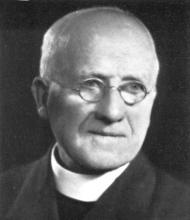Albert Power (priest) facts for kids
Albert Power SJ (born November 12, 1870 – died October 12, 1948) was a Roman Catholic Jesuit priest, a smart teacher, and a writer. He was known as one of the most famous Jesuit priests in Australia. People even called him "The Mighty Atom" because he was so energetic and influential!
Contents
The Life of Albert Power
Early Years and Education
Albert Power was born in Dublin, Ireland, in 1870. He started his schooling at Belvedere College in Dublin. Later, he studied at Tullabeg College in County Offaly.
After Tullabeg College, he went on to study at Milltown Park Theological College in Dublin. This is where he learned about theology and philosophy.
In 1906, he became a Roman Catholic priest in the Society of Jesus, also known as the Jesuits.
His Career as a Priest and Teacher
After becoming a priest, Albert Power moved to Australia. Around 1910, he became the director of studies at Riverview College in Sydney for six years. Today, this school is called Saint Ignatius' College, Riverview.
Power then went back to Europe to study more. He spent two years in Valkenburg, Holland, learning about philosophy and literature. After that, he returned to Milltown Park Theological College in Dublin. There, he taught theology, the Bible, and church history for ten years. For eight of those years, he was also the head of the college, known as the rector.
In 1919, Power returned to Australia. He became the rector of Newman College in Melbourne. The Archbishop of Melbourne, Daniel Mannix, really wanted Power for this job because he was a great scholar. Mannix even sent a telegram saying "Power or nobody." When Power took the job, he said he wanted to give students a good Christian education, just like the famous Cardinal Newman. He was known for his "big reputation for scholastic attainments," meaning he was very smart and well-educated. He was the rector of Newman College until 1923.
In 1923, Archbishop Mannix asked Power to become the first rector of a new college, Corpus Christi College, Melbourne. This college was founded in the same year.
Later Years and Passing
After he retired in 1948, Albert Power lived at Xavier College in Kew for several years.
When Power passed away, a special Mass was held for him at St Patrick's Cathedral, Melbourne. Archbishop Daniel Mannix led the service. Students from Corpus Christi College sang in the choir.
Being Watched
In 1918, Australian security officials kept an eye on Albert Power. A letter from April 1918 mentioned that he was a "very good speaker" and had "great influence." The letter also said that the reason for his visit to Australia was not known.
Another letter from July 1918 suggested that being a chaplain (a priest) on a troop ship was a way for certain people to enter the Commonwealth of Nations.
Helping Future Priests
In January 1952, a "Grateful Friend" wrote to The Advocate newspaper in Melbourne. They announced that a special fund, called a "burse," was being created in memory of Albert Power. This fund would help educate a priest for the Jesuit mission in India.
The Albert Power Debating Society
The Albert Power Debating Society was a popular group at Newman College. In the 1954 Newman College yearbook, it was reported that many students joined the society. They debated interesting topics like "That Newman should have a moat" and "that the press is worthy of its freedom." One fun debate was with a team of ladies from St Mary's Hall. The topic was "that it was better to have loved and lost than never to have loved at all."
The Albert Power Debating Society was active between 1927 and 1967. Its activities were often mentioned in the Newman College yearbooks. In 1937, the society had trouble getting enough students to participate, so it had to close for a year.
In 2010, the Albert Power SJ Medallion for Debating was awarded to Tom Litfin and Patrick McDonald, showing his lasting impact on debating.
Books and Writings
Albert Power wrote several books and pamphlets for the Australian Catholic Truth Society.
- Are They All Wrong?, publication date unknown.
- Six World Problems, 1927.
- Our Lady's Titles, 1928.
- Why We Honor St.Joseph, 1930.
- Plain Reasons For Being a Catholic, 1929.
Images for kids
 | Emma Amos |
 | Edward Mitchell Bannister |
 | Larry D. Alexander |
 | Ernie Barnes |



